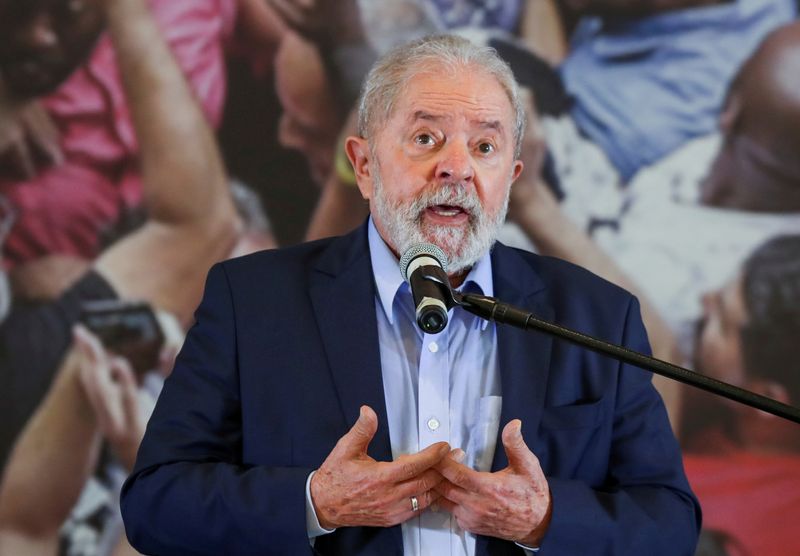Markets settle but Lula jitters remain after Brazil’s ‘Liz Truss moment’
2022.11.11 13:09
[ad_1]

© Reuters. FILE PHOTO: Brazil’s former President Luiz Inacio Lula da Silva gestures as he speaks during a news conference in Sao Bernardo do Campo near Sao Paulo, Brazil March 10, 2021. REUTERS/Amanda Perobelli
By Marcela Ayres and Lisandra Paraguassu
BRASILIA (Reuters) – Markets handed leftist Brazilian President-elect Luiz Inacio Lula da Silva a reprieve on Friday, clawing back heavy losses from the previous day’s meltdown which the country’s central bank chief said was akin to a “Liz Truss moment for Brazil.”
Brazil’s real currency and stock index both lost around 4% on Thursday, as Lula’s brief honeymoon with investors soured over his public commitment to prioritize social spending over fiscal rectitude and delays in naming his economic team.
On Friday, the real and stocks both rose as much as 2%, but jitters remained.
Central bank chief Roberto Campos Neto, speaking at an event in Sao Paulo, said Thursday’s rout was the latest example of markets demanding fiscal discipline amid a challenging global backdrop of high inflation, low growth and little risk appetite.
“I don’t know if that was a Liz Truss moment for Brazil, but it was a clear demonstration of the markets’ sensitivity to the fiscal issue,” Campos Neto said, referring to the former British Prime Minister who resigned after the markets punished her push for unfunded tax cuts.
Investors have called for Lula to restore firm rules for public spending after major outlays by outgoing President Jair Bolsonaro through the pandemic and election campaign. Instead, Lula is pushing to dismantle old budget rules to ramp up social spending.
Milton Maluhy Filho, the chief executive of Brazil’s largest lender Itau Unibanco, said on Friday that a balance needed to be struck.
“We think that fiscal responsibility and social responsibility should go hand in hand,” he said on a conference call, in reference to Brazil’s current economic situation.
Investors and even Lula allies have also expressed concern about delays in naming his finance minister. Lula has said he will only name his cabinet once he returns from the COP27 climate summit in Egypt.
Senator Simone Tebet, of the centrist Brazilian Democratic Movement party (MDB), said the economy minister should be his first cabinet pick to make clear what his policies are going to be affecting the economy.
“An economy minister is needed to explain the president’s political thought,” she told reporters.
Markets deepened losses on Thursday after the announcement of four economists aligned with the leftist Workers Party (PT) to handle budgetary issues as part of Lula’s transition team, including former finance minister Guido Mantega.
The rout made clear that many investors want to see more clarity over ministerial appointments and how Lula aims to stabilize Brazil’s public finances.
“Lula is making a serious mistake by delaying key cabinet positions, especially who will be his economy minister,” said Andre Cesar, a consultant at Hold Legislative Advisors in Brasilia, adding Lula should name them immediately.
“That would be a very positive signal and put an end to the unnecessary noise that has arisen now on the market,” he said.
After markets closed, a key lawmaker who had met with the transition team confirmed some investors’ fears that Lula wanted recurring exemptions from a constitutional spending cap.
Senator Marcelo Castro, the point man for the 2023 budget, said Lula backed not just a one-year waiver but a permanent spending cap waiver for the “Bolsa Familia” welfare program, which is slated to cost 175 billion reais ($32.7 billion)annually based on his campaign promises.
Lula, who takes office on Jan. 1, sought to downplay investors’ concerns. “The market is nervous for nothing. I have never seen a market as sensitive as ours,” he said.
($1 = 5.3449 reais)
[ad_2]
Source link








